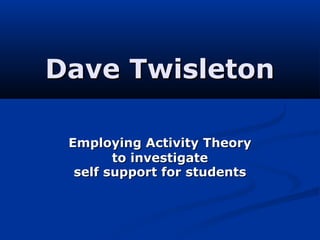
Activity Theory in student peer support
- 1. Dave Twisleton Employing Activity Theory to investigate self support for students
- 2. About Me Social Sciences 1998 Computer Science Technical Support 2008
- 3. Menu Activity theory overview Relevance to my research Analysis method AODM (Mwanza 2002) Value Status Follow on
- 4. Activity Theory Subject Object
- 5. Activity Theory Mediating Tool Subject Object
- 6. Activity Theory Mediating Tool Subject Object Community
- 8. Application Technical Support documents Problem classes Student initiated wikis Facebook groups
- 9. Activity Oriented Design Method Mwanza 2002 Conceptualising an activity system Eight-Step-Model Activity Notation Method for generating research questions Technique for mapping the activity system.
- 10. Data Gathering Student year Technical Support tools Typical problems Formal / informal groups
- 11. Eight Step Model Identify the: - Question to Ask Step 1 Activity of interest What sort of activity am I interested in? Step 2 Objective Why is the activity taking place? Step 3 Subjects Who is involved in carrying out this activity? By what means are the subjects performing Step 4 Tools this activity? Are there any cultural norms, rules or Step 5 Rules and regulations governing the performance of this Regulations activity? Who is responsible for what, when carrying out Step 6 Division of labour this activity and how are the roles organised? What is the environment in which this activity Step 7 Community is carried out? What is the desired Outcome from carrying out Step 8 Outcome this activity?
- 12. Activity Notation Actors Mediator Object-ive (Doers) (Purpose) Subjects Tools Object Subjects Rules Object Subjects Division of Labour Object Community Tools Object Community Rules Object Community Division of Labour Object
- 13. Generating Questions 6 General Questions: •What Rules affect the way the Subjects achieve the Objective and how? •How does the Division of Labour influence the way the Subjects satisfy their Objective? •What Tools do the Subjects use to achieve their Objective and how? •How do the Tools in use affect the way the Community achieves the Objective? •What Rules affect the way the Community satisfies their Objective and how? •How does the Division of Labour affect the way the Community achieves the Objective?
- 14. Generating Specific Questions
- 16. Next step Specific questions Different groups Focus groups?
- 17. Follow on New support tools – Wiki? Rules & guidelines for usage developed with students Work with tutors to improve problem classes
- 18. Bibliography Mwanza, D. (2002) “Towards an Activity-Oriented Design Method for HCI Research and Practice.” PhD Thesis - The Open University, United Kingdom. Ackerman, M. S. (1994). Augmenting the organizational memory: A field study of answer garden. Proceedings of the CSCW’94 Conference on Computer Supported Cooperative Work, 243–252. New York: ACM. Becker, Howard (1958). “Problems of Inference and Proof in Participant Observation.” American Sociological Review, Vol. 23, No. 6 (Dec, 1958), 652-660. Nardi, B.A. (1996) Context and consciousness: activity theory and human-computer interaction / edited by Bonnie A. Nardi. Cambridge, Mass.; London : MIT Press Linda L Briggs, "The Power of Wikis in Higher Ed," Campus Technology, 20/8/2008, http://www.campustechnology.com/article.aspx?aid=66505 Yahoo Design Patterns: http://developer.yahoo.com/ypatterns/